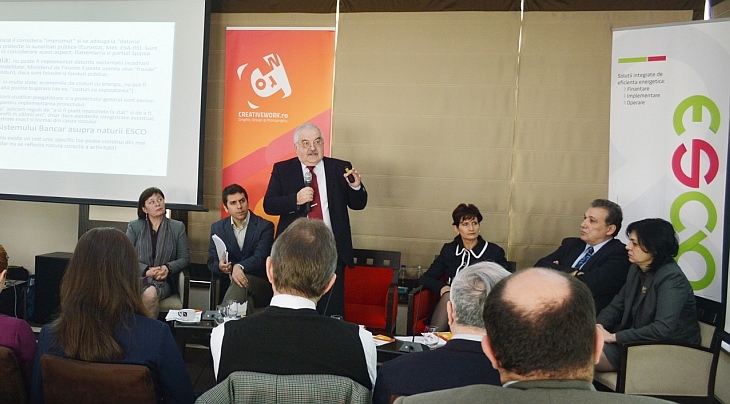The ESCO type services market has just started in Romania, with less than 20 companies active in this area. It is one of the reasons why energy efficiency services are often mistaken for energy services. The main difference comes from the fact that, for an ESCO, the activity compensation comes from and is related to energy efficiency which is guaranteed and supplied to the customer. As a result, the cheapest energy source – the one one saves – directly translates in a quantifiable manner in financial resources.
The ESCOROM Association of ESCO type Energy Services Companies in Romania was launched on March 12, to respond to the lack of information on this type of activity and to provide a “legitimate voice” for the ESCO industry in Romania. “We believe that the association will be useful for the banking institutions and for other type of financiers for their correct information in the conditions in which we find a great ignorance, at the vast majority of banks, regarding the specifics of the ESCO activities,” said the interim President of ESCOROM Cătălin Dragostin (Energy Serv Manager). It is necessary, he explained, that funders understand that to evaluate the energy efficiency projects, the application of other evaluation models than the standard ones currently imposed.
In addition to the lack of information, the development of the ESCO type of energy services in Romania is delayed by series of barriers in the legislative, fiscal, financial and regulatory fields. In the ESCOROM launching event, Cătălin Dragostin referred to the inability to fit specific energy efficiency activities in a single CAEN code. This leads to situations where ANAF inspectors questioned the correctness of the classification of certain activities. Likewise, the existing procedures for public procurement excludes de facto most of the ESCO type companies, which prevents the reduction for energy costs for the public institutions, known as intensive and highly wasteful consumers.
Cornel Rădulescu, from ANRE, insisted on identifying a model of the energy performance contract accepted by all parties. Currently, this model is still under consideration, including at the level of the Ministry of Finance.
From the European Bank for Development, Venera Vlad mentioned several already implemented projects for financing energy efficiency in Romania. These projects were met with great interest from the beneficiaries and all available funds have been used. “The concept of energy service is not in the Romanian legislation, such as the sanitation service, for example, and this prevents financing such services from loans,” Venera Vlad noted.
For the subsequent years, Romania will benefit from substantial amounts of European sources for financing energy efficiency in buildings and public lighting, mentioned Ionuț Trică, a MDRAP represeantative. The documentation is not yet approved and the first detailed information is expected in April.
The launch of the ESCOROM Association occasioned a warm reminder of the man who was Aureliu Leca, a personality whose involvement for almost five decades in the Romanian energy brought him close to mony of those present at the event – as a teacher, as a friend, as a close collaborator or mentor.
In the second part of the day, some ESCO type projects made in Romania were presented, from those performed by companies like Energy Serv, Krobath România, Servelect, Energobit ESCO, TEB Energy Business or Tractebel.
ESCOROM Association of ESCO type Energy Services Companies in Romania
Monica Zărnescu
executive director
0721 79 77 25
monica.zarnescu at escorom.ro
ESCO companies in Romania
- ENERGY SERV
- ENERGOBIT ESCO
- SERVELECT
- Q-POWER LINE
- KROBATH ROMANIA
- SE-GES
- ENERGY SERVICES GROUP
- ENERGO TECHNOLOGY Consulting
- ENEAS
- ELECTROCOND TECHNOLOGIES/Energy Philosophy
- COTHEC ENERGETIKAI UZEMELTETO
- EST INVEST TERMO
- TEB ENERGY BUSINESS
Report on the European market for ESCO services (2013)









